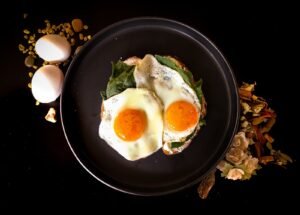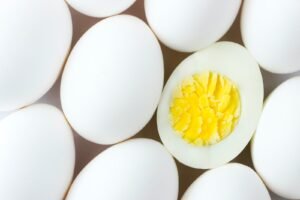Reviving Hard-Boiled Eggs: An Art Worth Mastering
Hard-boiled eggs are a staple in many households, loved for their versatility and nutritional value. However, what happens when you accidentally overcook your eggs and they become rubbery and unappetizing? Fear not, because there is an art to unboiling eggs that can save the day. In this article, we will explore the science behind unboiling eggs, provide a step-by-step guide on how to uncook hard-boiled eggs, discuss the tools and ingredients needed for the experiment, and delve into the potential applications and future possibilities of this intriguing process.

Understanding the Science Behind Unboiling Eggs
To comprehend the process of unboiling eggs, one must first understand the science behind it. When eggs are heated, the proteins in the egg whites denature and become solid. This is what gives hard-boiled eggs their distinct texture. Unboiling an egg involves reversing the denaturation process, essentially allowing the proteins to regain their original shape and fluidity. This can be achieved through a variety of techniques, including the use of chemicals and temperature manipulation.

Step-by-Step Guide to Unboiling Hard-Boiled Eggs
Unboiling a hard-boiled egg may seem like a daunting task, but with the right approach, it can be accomplished successfully. Here is a step-by-step guide to help you master the art of unboiling eggs:
- Start by carefully removing the shell from the hard-boiled egg, ensuring not to damage the egg white.
- Prepare a solution of water and a suitable chemical agent that aids in protein refolding, such as urea or guanidine hydrochloride.
- Gently place the egg into the solution and let it soak for a designated period, typically around 3-4 hours.
- After the soaking period, carefully remove the egg from the solution and rinse it thoroughly with water.
- Slowly introduce the egg to a cooler temperature, either by placing it in a cold water bath or refrigerating it.
- Allow the egg to cool for a sufficient amount of time, ensuring that the proteins have had enough opportunity to refold.
- Once the egg has reached a desired temperature, take it out and inspect its texture and consistency.
- If the egg is still not fully unboiled, repeat the process by soaking it again in the chemical solution and adjusting the temperature accordingly.
- When the desired texture is achieved, drain and dry the egg, and it is ready to be enjoyed or used in various recipes.
- Remember to store any unboiled eggs in a refrigerator to maintain their freshness and prevent the growth of bacteria.

Tools and Ingredients Needed for Unboiling Experiment
To successfully unboil hard-boiled eggs, certain tools and ingredients are essential. Here is a list of what you will need for the unboiling experiment:
- Hard-boiled eggs
- Chemical agents for protein refolding, such as urea or guanidine hydrochloride
- Water
- Containers for soaking and rinsing the eggs
- Thermometer to monitor temperatures
- Cold water bath or refrigerator for temperature manipulation
- Timer or clock to keep track of soaking time
- Paper towels for drying the eggs

The Role of Temperature in Uncooking Hard-Boiled Eggs
Temperature plays a crucial role in the unboiling process. By manipulating the temperature, you can encourage the proteins in the egg whites to refold and regain their original shape. Lower temperatures slow down the denaturation process, allowing the proteins to refold more easily. On the other hand, higher temperatures can speed up the denaturation process, making it more challenging to achieve the desired unboiled texture. Finding the right balance of temperature and time is key to successfully unboiling hard-boiled eggs.
Techniques for Safely and Effectively Unboiling Eggs
Unboiling eggs requires both precision and caution to ensure safety and effectiveness. Here are some techniques to keep in mind:
- Handle the hard-boiled eggs with care to avoid damaging the delicate egg whites while removing the shell.
- Always follow the instructions and safety guidelines when using chemical agents for protein refolding, as they can be hazardous if not handled properly.
- Use clean containers and utensils to prevent contamination during the unboiling process.
- Monitor the temperature closely to prevent overcooking or undercooking the eggs.
- Rinse the egg thoroughly after soaking to remove any residual chemical agents.
- Keep the unboiled eggs refrigerated to maintain freshness and prevent bacterial growth.

Factors Affecting the Success of Unboiling Process
Several factors can influence the success of the unboiling process. The quality and freshness of the eggs can impact the texture and taste of the unboiled eggs. Additionally, the concentration and type of chemical agent used, as well as the duration of soaking, can affect the extent of protein refolding. Temperature control is also crucial, as the proteins may not fully refold if the temperature is too high or too low. It is important to experiment with different variables to find the optimal conditions for unboiling eggs.

Troubleshooting Common Issues During Egg Uncooking
Unboiling eggs can sometimes present challenges and common issues. If the egg whites do not fully regain their original fluidity and texture, it may be due to insufficient soaking time or improper temperature control. Adjusting these variables and repeating the unboiling process can help overcome these issues. Additionally, if the egg develops an unpleasant odor or shows signs of spoilage, it is crucial to discard it immediately to prevent any health risks.

Tips and Tricks to Perfect the Unboiling Technique
To perfect the art of unboiling eggs, here are some tips and tricks to keep in mind:
- Start with fresh and high-quality eggs for the best results.
- Experiment with different chemical agents and concentrations to find the one that works best for you.
- Monitor the temperature carefully and make adjustments as needed.
- Take notes during each unboiling experiment to track the variables and outcomes.
- Practice patience, as achieving the desired texture may require several attempts.
- Explore different recipes and variations using unboiled eggs to unleash your culinary creativity.

Exploring Flavors: Unboiled Egg Recipes and Variations
Unboiled eggs open up a world of culinary possibilities. Once you have mastered the art of uncooking, you can incorporate unboiled eggs into various recipes and experiment with different flavors. From salads and sandwiches to deviled eggs and omelets, the options are endless. Unboiled eggs provide a unique texture and taste that can elevate your dishes and impress your guests.

Safety Precautions to Consider when Unboiling Eggs
While unboiling eggs can be a fun and intriguing process, it is important to prioritize safety. Chemical agents used for protein refolding can be hazardous if mishandled, so it is crucial to follow all safety guidelines and handle them with care. Additionally, ensure that the eggs used are fresh and properly stored to minimize the risk of foodborne illnesses. Always practice good hygiene and cleanliness throughout the unboiling process to maintain a safe food environment.

Unboiling Eggs: Potential Applications and Future Possibilities
The art of unboiling eggs not only offers a solution to overcooked eggs but also presents exciting possibilities for various industries. The ability to refold proteins could have implications in pharmaceuticals, biotechnology, and food processing. Unboiling eggs is just the tip of the iceberg, and further research and exploration of protein refolding techniques could unlock a wealth of potential applications in the future. So, next time you find yourself with an overcooked hard-boiled egg, remember that unboiling is an art worth mastering.
